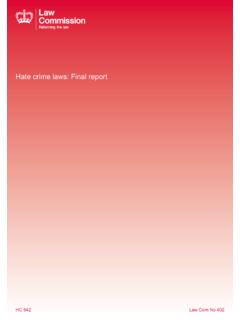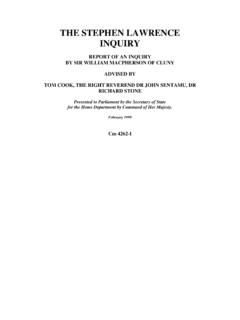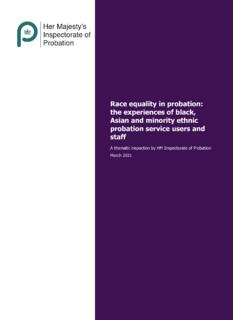Transcription of Identifying and Removing Barriers to Talented BAME Staff ...
1 Identifying and Removing Barriers to Talented BAME Staff Progression in the Civil Service Qualitative Research Findings December 2014. 1 FOREWORD. Many Talented BAME (Black, Asian and Minority Ethnic) Staff are motivated to join the Civil Service because they fundamentally believe in doing good'. There is no doubt senior leaders are committed to understanding the blockages that prevent Talented Staff , of all backgrounds, meeting their personal aspirations within the organisation and effectively delivering policies and public services.
2 The commissioning of this research by the Civil Service demonstrates a desire to confront the challenges that currently exist to harnessing the talents of its BAME Staff . However, we have been here before. This is not a new issue. The Civil Service has, in various places, at various times and at various levels, looked at these issues before. BAME Staff have been asked many times and in many ways about their experiences and the Staff we talked to are beginning to feel worn down. They question whether there is, in fact, a real appetite for change.
3 Policy intentions are clear but their implementation is often inconsistent, uncoordinated and lacking real drive. There is much that is good at a micro' level. Best practice can be seen within individual departments and many informal and formal processes are helping Talented BAME Staff develop the skills to progress. This being said, without a more strategic, focussed approach, driven from the top, Talented BAME Staff who feel they do not have equal access to opportunities within the Civil Service will look elsewhere.
4 It is time to acknowledge that many BAME Staff do not feel they are operating in a level playing field'. Diversity, in its broadest sense, needs to be on the agenda at every level in order to demonstrate real and committed action towards the Civil Service's vision of an open, fair and inclusive organisation. We were asked to consider our insights within three broad themes: Culture, Leadership and Accountability, and Talent Processes and Career Development. These themes are, in reality, interrelated and overlapping: for example one cannot consider leadership and accountability without the context of the prevailing culture.
5 We have attempted to be systematic in feeding back Staff perceptions of their reality', but the different elements need to be considered together in addressing how the Civil Service moves forward. We are grateful to all the BAME Staff who gave us their time and shared their experiences, all those who helped us with the logistics of delivering this work in time and the Civil Service leaders and management who provided much food for thought. 2 CONTENTS. 1. A Snapshot: Key Findings & Recommendations 4. 2. Background: who we spoke to and how 7.
6 3. The Context 9. 4. Key Findings Culture 14. Leadership and Accountability 18. Talent Processes and Career Development 25. 5. Recommendations 31. Appendices 3 2. A Snapshot: Key Findings & Recommendations This report details the findings from qualitative research on the blockages experienced by Talented BAME (Black, Asian and Minority Ethnic) Staff in the Civil Service. It provides insights into their experiences of working for the Civil Service and the Barriers they face around the themes of culture, leadership and accountability, and talent processes and development.
7 The report makes references to other surveys; the 2014 Civil Service People Survey and the Hay Group Removing Barriers to Success' survey (November 2014). Main Findings Current cultural and leadership climates are the main Barriers to the progression of Talented BAME Staff within the Civil Service. BAME Staff across all levels of responsibility do not feel they work for an organisation that is open, fair and inclusive. Lack of BAME role models at senior civil service (SCS). level is demoralising for those who are committed to a career in the Civil Service and want to progress.
8 They see a leadership that is not diverse and perceptions of an old boys club' persist. Many feel it is still the case that progression is based on whether your face fits' and this does not equate to an organisation that is committed to and values diversity. The lack of an explicit, clearly and consistently communicated diversity and inclusion strategy compounds the view that the Civil Service is not committed to ethnic diversity. Unconscious bias and discrimination persists which can block the progress of Talented BAME Staff and means there is not always equal access to promotions, projects, senior leaders and secondments.
9 All of this limits the aspirations and success of BAME Staff . The Performance Management Review is particularly criticised and is seen to disadvantage BAME Staff , who are more likely to be scored not met' in their reviews with often little objective feedback as to why. Line managers play a crucial role in supporting and developing Talented Staff . Whilst some BAME Staff interviewed say they have been well supported, others do not feel their line managers are focussed on their development, limiting their access to training and development opportunities.
10 Unconscious bias is blamed for this. The current talent processes, those targeting BAME Staff as well as mainstream schemes, work well as far as they go. However the reach and scope of these schemes is not sufficiently ambitious and access to them is not always fair or consistent. The lack of a structured career development process for those who complete these schemes can limit their effectiveness in developing and progressing Talented Staff . 4 Summary of Recommendations We make ten detailed recommendations grouped under the following broad headings: Culture 1.















